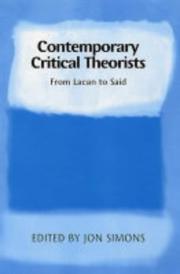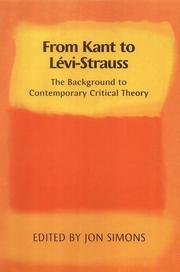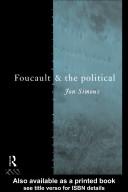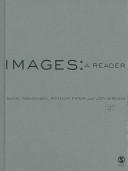| Listing 1 - 10 of 13 | << page >> |
Sort by
|

ISBN: 0748617191 0748617205 9780748617203 9780748617197 1474472621 Year: 2004 Publisher: Edinburgh: Edinburgh University Press in association with The Aga Khan University,
Abstract | Keywords | Export | Availability | Bookmark
 Loading...
Loading...Choose an application
- Reference Manager
- EndNote
- RefWorks (Direct export to RefWorks)
This authoritative guide introduces the key figures in contemporary critical theory for the beginning student. The critical theory covered in the volume includes: semiotics and discourse analysis; structuralism and post-structuralism; ideology critique; deconstruction; feminism; queer theory; psychoanalysis; postcolonialism; postmodernism; and the descendents of Frankfurt School Critical Theory. There are individual chapters on: Lacan; Althusser; Barthes; Derrida; Levinas; Kristeva; Irigaray; Cixous; Foucault; Lyotard; Deleuze; Baudrillard; and Guattari; Bourdieu; Habermas; Jameson; and Said. Each chapter provides biographical information and details about the thinker's intellectual context, an explanation of key concepts, an outline of the major angles of the theorist's work, an indication of ways in which their theory has been applied and suggestions for further reading. This text is designed as a companion to "From Kant to Levi-Strauss: The Background to Contemporary Critical Theory", which is also edited by Jon Simons and published by Edinburgh University Press.
Critical theory --- 316.2 --- #SBIB:044.AANKOOP --- Sociologische richtingen. Sociologische scholen. Sociologen --- 316.2 Sociologische richtingen. Sociologische scholen. Sociologen --- Théorie critique --- LITTERATURE --- ESTHETIQUE --- PHILOSOPHIE --- HISTOIRE ET CRITIQUE --- THEORIE

ISBN: 0748615067 Year: 2002 Publisher: Edinburgh Edinburgh university press
Abstract | Keywords | Export | Availability | Bookmark
 Loading...
Loading...Choose an application
- Reference Manager
- EndNote
- RefWorks (Direct export to RefWorks)
82:1 --- 82.09 --- Literatuur en filosofie --- Literaire kritiek --- 82.09 Literaire kritiek --- 82:1 Literatuur en filosofie
Book
ISBN: 1282899821 9786612899829 0748643265 9780748643264 9781282899827 9780748639731 074863973X 9780748639748 0748639748 Year: 2010 Publisher: Edinburgh : Edinburgh University Press,
Abstract | Keywords | Export | Availability | Bookmark
 Loading...
Loading...Choose an application
- Reference Manager
- EndNote
- RefWorks (Direct export to RefWorks)
In these 15 taster essays you will discover the key concepts and critical approaches of the theorists who have had the most significant impact on the humanities since 1990. On completing each chapter, you will find suggestions for further reading so that you can find out more and start applying the ideas in question. In addition to chapters on individuals such as Badiou, Ranci÷re and Spivak, there are chapters on Laclau and Mouffe, and a chapter on Green critical theorists. Key Features Written by experienced lecturers including John Armitage (Northumbria University), Paul Hegarty (University College Cork), David Huddart (Chinese University of Hong Kong), Simon Tormey (The University of Sydney), Samuel A. Chambers (Johns Hopkins University) Sets each theorist in their biographical and intellectual context The only book to offer chapter-length introductions to such a range of contemporary theorists making it the first place to look for an informed overview and evaluation Jon Simons has edited two other popular guides to critical theory: From Kant to LÃ♭vi-Strauss: The Background to Contemporary Critical Theory and Contemporary Critical Theorists: From Lacan to Said.
Critical theory. --- Sociology --- Social sciences --- Social philosophy --- Social theory --- Critical social theory --- Critical theory (Philosophy) --- Critical theory (Sociology) --- Negative philosophy --- Criticism (Philosophy) --- Philosophy, Modern --- Rationalism --- Frankfurt school of sociology --- Socialism --- Philosophy. --- École de Francfort. --- Sociologie et philosophie. --- Philosophie sociale. --- Théorie critique. --- Sociologie --- Sciences sociales --- Philosophie. --- Théorie critique. --- critical theories (dialectical critiques) --- SOCIAL SCIENCE --- LITERARY CRITICISM --- Regional Studies. --- Anthropology --- General. --- Middle Eastern. --- École de Francfort.

ISBN: 1280182415 9786610182411 1134855516 0203005147 9780203005149 0415100658 9780415100656 0415100666 9780415100663 9781134855513 6610182418 9781134855469 9781134855506 9781138150942 Year: 2003 Publisher: London: Routledge,
Abstract | Keywords | Export | Availability | Bookmark
 Loading...
Loading...Choose an application
- Reference Manager
- EndNote
- RefWorks (Direct export to RefWorks)
Michel Foucault's involvement with politics, both as an individual and a writer, has been much commented upon but until now has not been systematically reviewed. This is the first major introductory study of Michel Foucault as a political thinker.Jonathon Simons explores the importance of the political in all areas of Foucault's work and life, including important material only recently made available and the implications of various revelations about his private life. Simons relates Foucault's work both to contemporary political thinkers such as Michael Walzer, Charles Taylor and Jurgen Hab
Political science --- Social sciences --- Social philosophy --- Social theory --- Political philosophy --- Philosophy. --- Foucault, Michel --- Contributions in political science. --- Philosophy --- Fūkūh, Mīshīl, --- Foucault, Michael, --- Fuko, Mišel, --- Pʻukʻo, --- Pʻukʻo, Misyel, --- Phoukō, Misel, --- Fuke --- 福柯 --- Fuḳo, Mishel, --- Political science - Philosophy. --- Social sciences - Philosophy. --- Foucault, Michel - Contributions in political science.

ISBN: 9781412900454 9781412900447 141290045X Year: 2006 Publisher: London Sage
Abstract | Keywords | Export | Availability | Bookmark
 Loading...
Loading...Choose an application
- Reference Manager
- EndNote
- RefWorks (Direct export to RefWorks)
Image (Philosophy) --- Popular culture. --- Visual communication. --- Visual sociology. --- Image (Philosophy). --- Popular culture --- Visual communication --- Visual sociology --- Sociology --- Graphic communication --- Imaginal communication --- Pictorial communication --- Communication --- Culture, Popular --- Mass culture --- Pop culture --- Popular arts --- Intellectual life --- Mass society --- Recreation --- Culture --- Philosophy
Periodical
Publisher: Manchester New York Manchester University Press
Abstract | Keywords | Export | Availability | Bookmark
 Loading...
Loading...Choose an application
- Reference Manager
- EndNote
- RefWorks (Direct export to RefWorks)
Book

ISBN: 9781474472623 Year: 2022 Publisher: Edinburgh
Abstract | Keywords | Export | Availability | Bookmark
 Loading...
Loading...Choose an application
- Reference Manager
- EndNote
- RefWorks (Direct export to RefWorks)


ISBN: 9781474472630 9780748615063 Year: 2022 Publisher: Edinburgh Edinburgh University Press
Abstract | Keywords | Export | Availability | Bookmark
 Loading...
Loading...Choose an application
- Reference Manager
- EndNote
- RefWorks (Direct export to RefWorks)
Book

ISBN: 0813585392 0813585406 9780813585406 9780813585390 9780813585383 0813585384 9780813585376 0813585376 Year: 2017 Publisher: New Brunswick, NJ : Rutgers University Press,
Abstract | Keywords | Export | Availability | Bookmark
 Loading...
Loading...Choose an application
- Reference Manager
- EndNote
- RefWorks (Direct export to RefWorks)
In/Visible War addresses a paradox of twenty-first century American warfare. The contemporary visual American experience of war is ubiquitous, and yet war is simultaneously invisible or absent; we lack a lived sense that "America" is at war. This paradox of in/visibility concerns the gap between the experiences of war zones and the visual, mediated experience of war in public, popular culture, which absents and renders invisible the former. Large portions of the domestic public experience war only at a distance. For these citizens, war seems abstract, or may even seem to have disappeared altogether due to a relative absence of visual images of casualties. Perhaps even more significantly, wars can be fought without sacrifice by the vast majority of Americans. Yet, the normalization of twenty-first century war also renders it highly visible. War is made visible through popular, commercial, mediated culture. The spectacle of war occupies the contemporary public sphere in the forms of celebrations at athletic events and in films, video games, and other media, coming together as MIME, the Military-Industrial-Media-Entertainment Network.
War in mass media. --- Mass media and war --- War and society --- Society and war --- War --- Sociology --- Civilians in war --- Sociology, Military --- War and mass media --- War in mass media --- Mass media --- History --- Social aspects --- america, american, war, warfare, military presence, war zone, war culture, violence, invisible, war overseas, overseas, global war, war on terror, politics, war politics.
Digital

ISBN: 9780748643264 9780748639731 Year: 2022 Publisher: Edinburgh Edinburgh University Press
Abstract | Keywords | Export | Availability | Bookmark
 Loading...
Loading...Choose an application
- Reference Manager
- EndNote
- RefWorks (Direct export to RefWorks)
| Listing 1 - 10 of 13 | << page >> |
Sort by
|

 Search
Search Feedback
Feedback About UniCat
About UniCat  Help
Help News
News